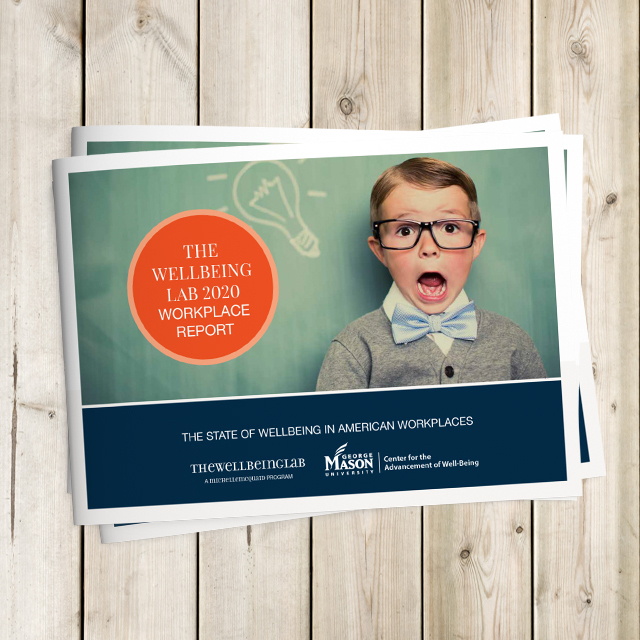by Nance Lucas, Ph.D., CWB Executive Director, GMU Chief Well-Being Officer
This edition of the Thriving Together Series is part 1 of an 8-week series adapted from The Well-Being Lab 2020 Workplace Report, a collaboration between our center and The Well-Being Lab (a Michelle McQuaid program). The report is based on two surveys of more than 1,000 workers each, throughout the United States.
This introduction is written by our center’s Executive Director and George Mason University’s Chief Well-Being Officer, Nance Lucas, Ph.D.
One of the most powerful, yet simplistic reasons why so many of us are engaged in the work of well-being is that people matter. This same premise rings true in American workplaces as evidenced by the findings in The Well-being Lab 2020 Workplace Report – a collaboration between The Well-being Lab and the Center for the Advancement of Well-Being. As the findings in this report show, leaders can impact employees’ well-being for powerful results. But it’s not the sole responsibility of leaders and managers – everyone matters in creating conditions where all employees thrive.
We are no longer at an inflection point of making the business case for well-being in our organizations. COVID-19 is the new business case. And while there were compelling reasons prior to this pandemic, like lower levels of employee engagement combined with growing mental health challenges in the workplace, this time is different. As many employees return to their work sites, their mental states will be filled with additional distress and anxieties about new health risks – theirs and others.
This pandemic is ushering in many disruptions, with health at the top of the list. And because of that, we are in search of the new workplace that minimizes risk while keeping employees and teams engaged and connected to each other. For leaders, this is an opportunity to rethink the social compact between employees and their organizations. As regions around the world begin to return to work, we need to think creatively about how we create and sustain conditions in the new workplace where everyone matters and thrives.
Some of the findings in this report inspire a call to action for leaders if they want to get the best out of their employees and teams. For example, only 14% of American workers in this study reported that their manager regularly shows care, compassion, and appreciation for them, yet other surveys reveal that being appreciated for the work employees do is more important than receiving a bonus or raise.
Workers who report higher levels of psychological safety are more likely to be thriving despite any challenges they may be experiencing. Only 42% of the respondents in this report feel psychologically safe at work. Managers and leaders can learn how to create environments where employees and teams feel safe to express their concerns and identify areas where they need help without fear of losing their jobs.
This is a major implication for the new workplace compact and what leaders can do to ease the additional anxieties employees bring with them as they return to their physical workplaces. Showing care and compassion towards others are essential (typically referred to as soft) skills of effective leaders. These essential leadership skills will be the dividing line for organizations that succeed in a post-COVID world.
A common goal that all managers and leaders care about is productivity. And yet there’s an order to achieving this – starting first with investing in people, followed by aligning purpose, which results in greater productivity. The findings in this report validate this strategy.
This is the moment for leaders to be asking great questions about what they can do to better invest in their employees’ well-being, and then engage the whole organization in creating those changes. Another critical finding was that employees who have access to these resources and know how to apply them in their lives are more engaged and thriving when their well-being was supported in the workplace. The workplaces that succeed in making this new compact in a post-COVID world will be the ones where people feel cared for, feel safe, and are connected to others in meaningful ways – where health and well-being are priorities. Those are the organizations where employees will be more motivated to return to work and who will most likely thrive beyond these new challenges.
I commend The Well-being Lab, led by Dr. Michelle McQuaid, and the research team for illuminating these important findings and implications for leaders and managers. Now let’s together create workplaces where everyone matters and thrives.
Additional Resources
Learn how to apply the science of well-being to your leadership, in our Leading to Well-Being certificate programs.
Measure your well-being through the free PERMAH Well-Being Survey. See how you’re doing when it comes to your levels of thriving and struggle, and your abilities and motivation to care for your well-being. You can even create a free personal well-being plan, drawing on more than 200 evidence-based well-being actions. You can also use this tool for teams or entire workplaces.
Write one of these Thriving Together Series features! We’re looking for contributions on all topics related to well-being. Read other Thriving Together Series articles here and contact us at cwb@gmu.edu for guidelines. Thank you for helping our Mason community thrive together online!






















